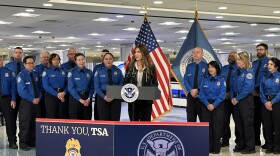More than 70,000 excited fans will fill Allegiant Stadium for the Super Bowl this Sunday in Las Vegas. But there will also be a group of protesters, who want teams to stop using names and terms that are derogatory toward Native Americans.
“We are people first. Not 'redskins.' We are not scouts, we are not chiefs, we are not squaws...”
This is an excerpt from a documentary called Imagining the Indian: The Fight Against Indian Mascots. It's a battle Native people have been waging for decades.
Gaylene Crouser, a member of the Sioux tribe and founder of the Kansas City Indian Center said there has been some success.
“The Washington team changed their name a few years ago. They're were the 'R word' as we say it, because it was a slur,” Crouser said.
Some states such as Colorado have banned schools from using Native references. According to the National Congress of American Indians, at least 21 states have introduced proposals to do away with Native American mascots in schools.
Renaming a team's mascot is just one change Native people want to see. They've been able to get the team to ban wearing headdresses at home games but they also want them to stop instigating fans to do the “tomahawk chop,” as many Chiefs fans do at games.
“That's just evocative of stereotypes of who native people are, when in reality that's not who we are at all,” Crouser said.
She said perpetuating stereotypes is damaging to the mental health of Native children, citing studies by the American Psychological Association. But she admits it's hard to blame people, because she says our educational system doesn't adequately and accurately teach young people about Native history.
“There is a very lack of education in public schools about the attempted genocide of Native people," she said. "There's also a lack of education about the fact that we exist as contemporary people. And there's all of this romanticism in media going back decades. There's also there's sense of entitlement for people to use our imagery and our sacred objects and different things for their own purposes and well, commercialize it.”
Crouser said she hopes people will stop and speak with them outside of Allegiant Stadium before the game on Sunday and understand their message: “We'll have signs telling people that stereotyping harms Native people and that the chop is racist. There's inherent racism in using a race of people as a mascot.”
This story was produced by the Mountain West News Bureau, a collaboration between Wyoming Public Media, Nevada Public Radio, Boise State Public Radio in Idaho, KUNR in Nevada, KUNC in Colorado and KANW in New Mexico, with support from affiliate stations across the region. Funding for the Mountain West News Bureau is provided in part by the Corporation for Public Broadcasting.








